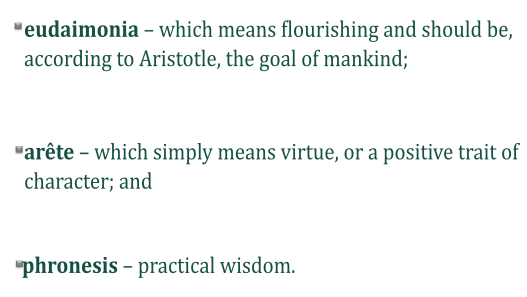![]()
Virtue ethics is a moral philosophy which emphasises an individual’s character as the key element of ethical thinking. It is rooted in the work of Greek philosopher Aristotle. It is often contrasted with other moral theories, including deontology and utilitarianism, and is experiencing a revival in the western world. At the heart of virtue ethics are three important concepts:

Watch this film by Professor Kristján Kristjánsson for an introduction to virtue ethics.
View the below presentation which provides an overview of virtue ethics and how it compares and contrasts to other moral theories such as deontology and utilitarianism.
![]()
![]()
Please watch this video on virtue ethics:
![]()
Download the table on Aristotle’s concept of the ‘golden mean’. The table lists principle vices as both a deficiency and excess. Complete the table by adding the balance, or the mean where prompted. You will find an example done for you.
Compare your answers with a fellow student and discuss any differences. Think about whether there are any character strengths that are always and intrinsically good, i.e. that aren’t seen as the golden mean between vices.
![]()
Go back to your notes and write a short definition of virtue ethics in your own words. Discuss your definition on the discussion boards.
![]()
Download the worksheet and complete the Venn diagram. Compare the similarities and differences of virtue ethics, utilitarianism and deontology.
![]()
Read the scenario below:

Write a paragraph detailing the brief you would give to your partners  in this scenario. Discuss your brief on the discussion boards.
in this scenario. Discuss your brief on the discussion boards.
![]()
J. Annas – An examination of Nietzsche’s conception of virtue, one very different from Aristotle’s, in order to explore the issue of the grounds needed for making one conception of virtue, rather than another, central to ethical theory. | L. Besser-Jones – This paper explores the viability of a fully naturalized virtue ethics by considering two avenues with the potential to establish a naturalized account of normativity: one teleological, one by analogy with health. | J. Annas – Virtue ethics is sometimes taken to be incapable of providing guidance for an individual’s actions. This paper shows how virtue ethics does provide guidance for action, but that it cannot account for the force of duty and obligation. | K. Barg and J. Conroy – This paper reports findings of a study evaluating the effects of a Scottish character education programme on a number of secondary students’. |











